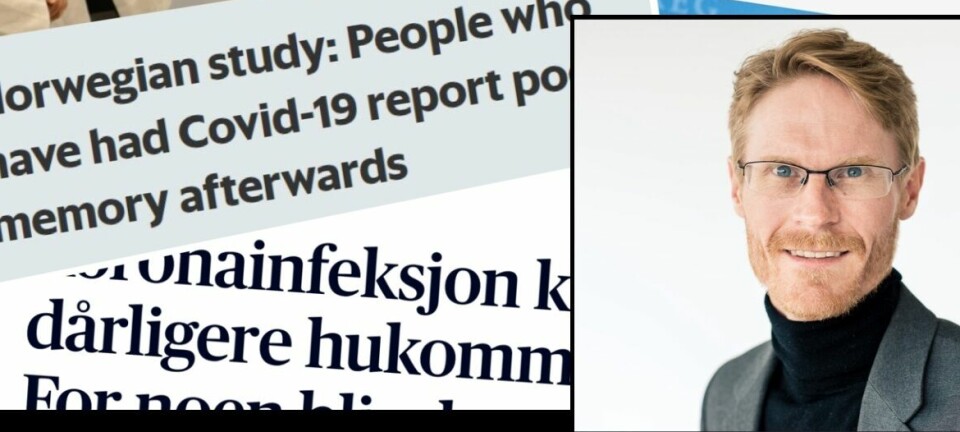
Long Covid does not cause lasting brain damage, study reveals
Young people with persistent post-infective symptoms from Covid-19 did just as well on tests as others.
Researchers at Akershus University Hospital (Ahus) and the University of Oslo have investigated whether Covid-19 causes long-term effects in the brain.
A total of 466 young people between the ages of 12 and 25 were tested at six-month intervals. The vast majority had had Covid-19, while 85 who had not been infected were in a control group.
Half of the participants experienced persistent post-infective symptoms, meaning long Covid. They had a variety of symptoms, such as concentration difficulties, poorer sleep and memory, and pain.
"They experienced that they had poorer memory and that they had brain fog," says Vegard B.B. Wyller, who was involved in the study. Wyller is a research leader at the Pediatric and Adolescent Clinic at Ahus and a professor at the University of Oslo's Institute of Clinical Medicine.
The researchers wanted to find out whether the long Covid symptoms were linked to poorer brain functioning or damage to the brain.
Tested how the brain functioned
The participants underwent several tests. They were examined by doctors and took neurocognitive tests which measured memory, concentration, problem solving, language, and motor skills. The researchers analysed their blood to look for signs of brain damage.
Participants also answered questionnaires about their health. Half of them described symptoms consistent with long Covid.
The results showed no signs of brain damage in those who had had Covid-19.
There were also no differences in the neurocognitive tests between those who had had the virus and those who had not.
No difference with long Covid
Participants who had long Covid symptoms performed similarly on tests of memory, concentration, and sleep as those who did not have long Covid.
“They experienced that they forgot easily and had brain fog, but when we tested them, they were just as proficient as the others,” Wyller tells sciencenorway.no.
The researchers concluded that long Covid symptoms do not cause lasting problems or damage to the brain.
“This is an important result, because many people remain worried about their health having been harmed after a Covid infection. When the pandemic came, we didn't really know what this virus was, and many were scared. But our study shows that the brains of the people we tested are perfectly fine,” he says.

Long Covid without Covid-19
The participants in the study were assessed for long Covid according to the World Health Organization (WHO) definition.
WHO defines long Covid as continuing or new symptoms three months after a Covid-19 infection, where the symptoms last for at least two months and there is no other explanation for them.
The assessment was done blindly. Two researchers who did not know who had had Covid-19 and who had not evaluated each participant separately. If the researchers did not agree, a third researcher was brought in.
It turned out that 40 participants who had not had a Covid-19 infection had long Covid. This constituted half of the control group.
That surprised the researchers.
“Strictly speaking, participants in the control group had not had long Covid, but they had exactly the same symptoms. It shows that these symptoms are very common in the general population. And it shows that the World Health Organization's definition is quite useless,” Wyller says.
The study has some limitations.
No brain damage
“Study participants had a normal Covid-19 infection, like most of us did. The results may be different for people who had a serious infection and were admitted to hospital,” Wyller says.
All the participants were young, and most of them had had the same variant of the Covid-19 virus. Therefore, it is not certain that the results can be applied to people who were infected by other variants or to all age groups.
“Nevertheless, the study indicates that most people don’t need to fear that they will struggle with long-lasting damage or that they have brain damage,” he says.
This contradicts the idea that long Covid symptoms are due to neuroinflammation, meaning activation of the immune system after the infection is over.
Results from the large Covid-19 study at Oslo University Hospital recently showed that people feel that their memory has deteriorated after Covid-19. This can affect quality of life, Arne Søraas told sciencenorway.no. He points to the possibility that this might be related to autoimmunity.
“The difference between our study and other studies on long Covid is that we have carried out clinical tests on the participants. Despite their symptoms, they do not perform worse than others on the tests," Wyller says.

Looking at the whole picture
The Norwegian Institute of Public Health (NIPH) provides systematic summaries of the research on long-term effects after Covid-19. They have also seen that memory problems are a common symptom of long Covid.
“Since many studies are based on self-reported symptoms, these are subjective findings. But even if the symptoms are subjective, they provide important insight into how people experience their health and well-being,” Jan Himmels, a senior adviser at NIPH, writes in an email to sciencenorway.no.
He believes that the combination of subjective and objective findings contributes to a more holistic understanding of the virus and its after-effects.
When the Norwegian Institute of Public Health gives advice, it is based on a wide range of studies, and not just on individual studies, Himmels notes.
“This ensures a more comprehensive and reliable approach,” he writes.
Himmels thinks the new study from Ahus and the University of Oslo is interesting, and that the researchers provide a good description of the findings and possible limitations.
There is still a need to learn more about the mechanisms behind long Covid, the researchers write in their study, which was published in the journal Frontiers in Neurology.
———
Translated by Nancy Bazilchuk
Read the Norwegian version of this article on forskning.no
Reference:
Havdal et al. Neurological involvement among non-hospitalized adolescents and young adults 6 months after acute COVID-19, Frontiers in Neurology, vol. 15, 2024. DOI: 10.3389/fneur.2024.1345787






































